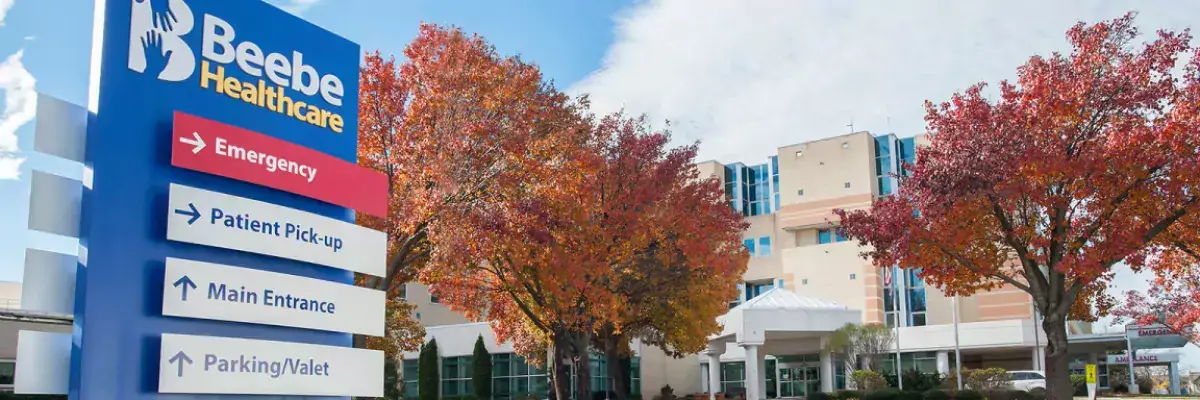Beebe Healthcare Presents Annual Quality and Safety Awards to Four Teams Making a Positive Difference
Quality and safety are – and always have been – top priorities at Beebe Healthcare. Each year, the hospital’s Quality and Safety Committee presents a series of awards to teams across the organization, recognizing those who have identified an issue or problem and have put plans in place to address and resolve it.
Awards are presented to teams who have implemented new quality and safety initiatives, with metrics and sustainability plans attached. Teams are also encouraged to share lessons learned and best practices with their colleagues across Beebe.
Beebe Healthcare’s Quality and Safety Committee is pleased to announce its 2022 Quality and Safety Award winners:
Extended Care Process at the Main Campus Emergency Department (led by Teri Wilkinson, MSN, RN, CEN, Director of Emergency and Trauma Services; Susan Mross, RN, Emergency Room Manager; and Lindsay White, RN, Emergency Room Team Lead)
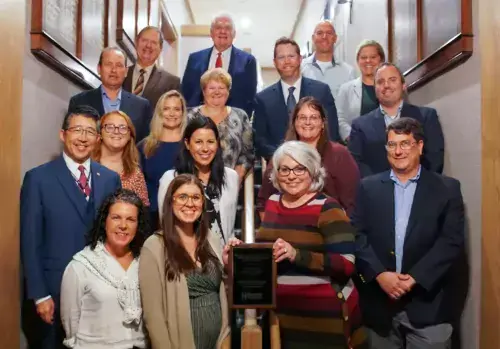
Back row (3), Stephen Fanto, MD, Terry Megee, Jon McGonegal, RN. Third row (4), Paul Peet, MD, Janet Lonaberger, RN, Kevin Eanes, MD, Lindsay Grubish, MD. Second row (5), Caitlyn Hardy, Katrina Sellers, RN, Teri Wilkinson, RN, (white sweater), Jessie Simpson, RN, Nicholas Perchiniak, MD. Front row (5), Dr. David Tam, Jaime Maroney, RN, Lindsay White, RN, Susan Mross, RN, and Kevin Bristowe, MD.
The purpose of this initiative was to streamline patient intake and triage processes in the Emergency Department, allowing EMS providers to hand off reports to nurses without delay and making it possible for patients to receive initial care in a more expedited manner.
An “Extended Care” area was created in the lobby, managed by a team of nurses whose task is to conduct initial assessments and start workups on patients quickly upon their arrival. The process was implemented to reduce the number of patients leaving the Emergency Department without evaluation and treatment, while also reducing the amount of time EMS providers need to remain on-site.
Additionally, it helps assure that Emergency Department beds remain reserved for patients presenting with the most acute medical conditions. The new process has proven to be incredibly impactful, with an average of 30 to 50 patients treated in the Extended Care area each day, and a drastic decrease in the number of patients awaiting care for extended periods of time in the ED.
Improving Pre-Hospital EMS/Emergency Department Communication Using a Secure Application (led by Ravin Davidson, RT (R), Data Abstractor, Cath Lab Tech; Lori Kline, RN, Nurse Manager for Cath Lab; and Susan Mross, RN, Emergency Room Manager)
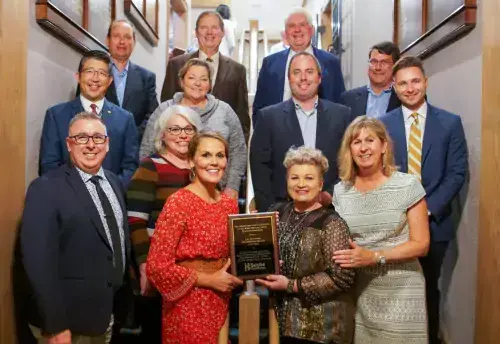
Back row, Paul Peet, MD, Stephen Fanto, MD, Terry Megee, Kevin Bristowe, MD. Middle row, Dr. David Tam, Donna Connor, NP, Nicholas Perchiniak, MD, Tom Trobiano. Front, Robert Mauch, Deputy Director EMS, Susan Mross, RN, Ravin Davidson, RRT, Lori Kline, RN, Michele Sieler, RN.
A communications system was in place to allow EMS teams to notify Beebe’s Emergency Department providers as patients were enroute requiring urgent cardiac care. Now, with financial support from Beebe Medical Foundation, the Emergency Department invested in a new and improved communications system capable of streamlining the process further.
As a result, ER providers and cardiologists can now proactively receive and review EKGs. Patient information can be reviewed, and beds can be assigned before arrival to the hospital, which has led to significant improvements in lifesaving cardiac care.
Improving Outcomes for Infants with Neonatal Opioid Withdrawal Syndrome (led by Nancy Foryth, MSN, APRN, NNP-BC, and Bridget Buckaloo, MS, RN, Director Women's and Children's Services)
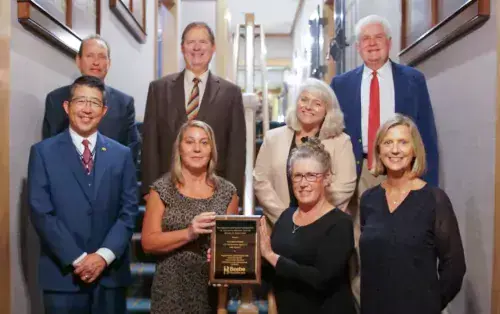
Back row, Paul Peet, MD, Stephen Fanto, MD, Ann Regacho, MSW, Terry Megee. Front, Dr. David Tam, Theresa Crowson, RN, Nancy Forsyth, NNP, Bridget Buckaloo, RN.
The number of infants born with Neonatal Opioid Withdrawal Syndrome (NOWS) has been on the rise for years, and research shows that in the state of Delaware, 24 out of every 1,000 babies are born addicted.
Beebe has established a comprehensive, evidence-based plan of care for women and their babies who require specialized support, under these conditions. It facilitates a “room-in model,” where new moms are supported in learning their infant’s withdrawal cues. In tandem, providers can assess the degree of withdrawal a baby is experiencing and can provide comfort measures, environmental modifications, breastfeeding support, and medications, as needed.
A robust discharge planning process is in place, providing notification to the Division of Family Services and referrals for in-home and outpatient services. This initiative is reducing length of hospital stay and hospital readmissions, as well as the number of patients requiring transfer to other healthcare facilities.
Congestive Heart Failure Readmission Reduction (led by Holly Marvel, RN, Manager of Care Navigation; Krista Henshaw, NP, Population Health Nurse Practitioner; and Thomas Trobiano, FNP-C, MAPC, Executive Director of Cardiovascular Services)
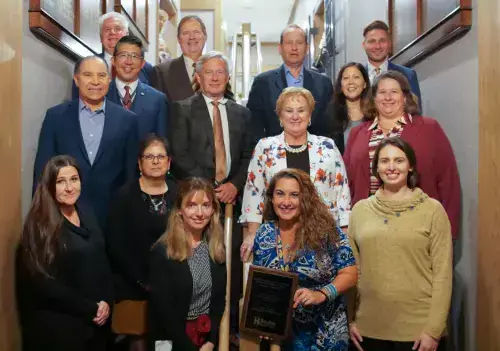
Back row, Paul Peet, MD, Stephen Fanto, MD, Terry Megee, Tom Trobiano. Third row, Dr. David Tam, Mark Boytim, MD, Holly Rader, NP. Second row, Ramon A. Rosa, MD, Janet Sockriter, RN, Casey Berger, RN. Front, Audrey Moore RN, Mary Roche, RN, Katelyn Steele, RN, Krista Henshaw, NP, and Kiernan Quay, NP.
Hospital readmission rates for patients experiencing Congestive Heart Failure (CHF) were on the rise at Beebe.
An initiative was developed to help reduce hospital readmissions for patients experiencing Congestive Heart Failure. It was deployed with a goal to put process improvement plans in place to reduce the need for readmission.
A 30-Day Transition of Care team was also created, tasked to identify patients at high-risk for readmission, and to put interventions in place to decrease the need for readmission. Additionally, systems were put in place to strengthen the connection between Beebe’s clinical providers and partnering skilled nursing facilities, and to facilitate stronger communication with Beebe’s Home Care team.
“The awards presented by Beebe’s Quality and Safety Committee truly underscore our team’s commitment to doing what is best for our patients,” said Marcy Jack, JD, BSN, CPHRM, CPHQ, Vice President, Chief Quality Officer. “Here, internal teams are encouraged to think strategically and creatively about how to deliver patient care in ways that optimize quality and safety within their clinical environments. In some cases, it’s about new approaches to improve clinical outcomes. In other cases, it’s about optimizing the patient experience. What is clear is that quality and safety are key priorities at Beebe and remain set at the center of our daily operations.”
